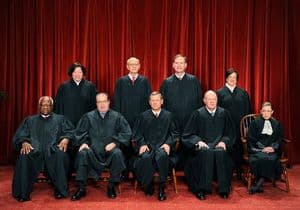 In a surprise move, the Supreme Court today ruled 7-2 that Arizona cannot require voters to prove their citizenship when submitting voter registration forms. The New York Times reports on the ruling, authored by Justice Antonin Scalia (yes–you read that right):
In a surprise move, the Supreme Court today ruled 7-2 that Arizona cannot require voters to prove their citizenship when submitting voter registration forms. The New York Times reports on the ruling, authored by Justice Antonin Scalia (yes–you read that right):
Justice Antonin Scalia, writing for the majority in Arizona v. Inter Tribal Council of Arizona, No. 12-71, said a federal law requiring states to “accept and use” a federal form displaced an Arizona law requiring various kinds of proof of citizenship.
The federal law, the National Voter Registration Act of 1993, allows voters to register using a federal form that asks, “Are you a citizen of the United States?” Prospective voters must check a box for yes or no, and they must sign the form, swearing under the penalty of perjury that they are citizens.
The state law, by contrast, required prospective voters to prove that they were citizens by providing copies of or information concerning various documents, including birth certificates, passports, naturalization papers or driver's licenses, that are available only to people who are in the state lawfully.
Today's ruling was centered around the concept of 'preemption,' under which the federal laws are generally seen to trump state laws. Think Progress has more on the preemption issue, which Scalia ruled is especially pertinent in laws affecting federal elections:
As the Court points out, this broad view of the federal role in governing elections is consistent with the Constitution's text, which provides that “[t]he times, places and manner of holding elections for Senators and Representatives, shall be prescribed in each state by the legislature thereof; but the Congress may at any time by law make or alter such regulations.”
The Supreme Court is expected to rule on the constitutionality of a major component of the Voting Rights Act by the end of next week.
Watch an MSNBC analysis of today's ruling, AFTER THE JUMP…




